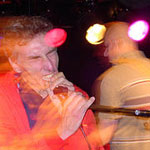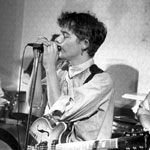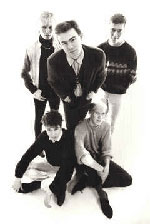
I don’t remember a great deal about 1986. My greatest memory of that year is of cycling over Alpine passes, dreaming of emulating Tour De France heroes. I certainly didn’t care much about the NME’s C86 showcase shows at the ICA that summer. To be honest I still don’t. I still aver that the C86 phenomenon was a media construct designed to sell more copies of a music press flailing to find direction, and that outside of the tiny macro-scenes and networks that existed, there really was not a homogenous ‘indie’ aesthetic. That all came later, for better or for worse. It’s therefore with a mixture of mistrust and nostalgic intrigue that I approach the Still Doing It For Fun nights at the ICA.
The headline acts on both nights are certainly disappointments. The Magic Numbers are a group I have never understood the appeal of. I give them five minutes to convince me of their worth, and consider myself generous allowing them that luxury. It only takes three, however, for me to know that they are leaden and lumpen and that I want no part of their dreary rumble.
Roddy Frame at least has a claim to being a formative influence on the sound of the post-post-punk independents. He jokes about knowing you’re getting old when you lie about what NME cassette you were on, and quips about the groups of the C86 evolution being all manic depressives with high cheekbones staring into space. After an interminable number of what one assumes are his newer songs, the words ‘pot’, ‘kettle’ and ‘black’ spring to mind. The opening salvo of a glistening ‘Just Like Gold’ and a cover of Orange Juice’s ‘Falling and Laughing’ only throw into stark contrast the dreary earnestness of the new songs, whilst the audience rendition of the chorus to ‘We Could Send Letters’ is distressing enough to have me packing my bags and heading into the night, grumbling about cabaret Pop. I can’t decide what is most depressing: the fact that he looks impossibly young, or the fact that he sounds so horribly old, serious and sleek.

Vic Godard, who opens the Friday proceedings, is even more of a legendary figure in the historical context of ‘Indie’. With impeccable references as one of the most inspirational figures of the Punk revolution, Godard in the mid to late ‘80s was rightly lauded for being a maverick, for exploring new avenues of style and offering alternatives beyond the confines of the Rock tradition. It’s something of a shame then to see him plugging that over-abused Punk sound again now. And there is something sadly ironic about someone singing about opposing all rock’n’roll whilst standing with a foot on the monitor in classic r’n’r pose. But then again, contradictions are an essential element of all great Pop, so maybe it just proves what a genius he is after all.
Phil Wilson is another inspirational figure in the development of the ‘indie’ scene of the ’80s and beyond. The June Brides, who Wilson fronted, were surely the obvious bridge between the sound of the Postcard brigade and the more jangling of the C86 groups and were rightly regarded as one of the groups who might have made some kind of ‘crossover’. Listening back to the comprehensive Every Conversation retrospective, it’s clear that the lasting value of June Brides is in the marvellous wedding of sublime songs with the electric energy of youthful exuberance, anger and passion. With Wilson playing with only Big John on trumpet and a tinny pre-recorded backing track as accompaniment, this is about as close to the DIY ethic of the times as we get during the two nights. Phil plays with the infectious enthusiasm and delight of someone long since detached from the music industry and is a breath of fresh air. It feels like a wry ‘see what you missed’ gesture as much as it does a celebration of great songs and bittersweet memories.
Then there is Lawrence and his latest Go Kart Mozart incarnation. Lawrence’s obsessive quest for stardom has spanned two and half decades, during which he has created a body of work more impressive than most, from the ultimate underground band of the ’80s in Felt to the ultimate underground band of the ’90s in Denim. Go Kart Mozart have yet to truly live up the expectations set by those two previous groups, and on record they can sound frustratingly obtuse, throwing bizarre sideways references to hopelessly obscure Pop cultural icons. They are not easy records to love, though I would suggest they are worth persevering with, for they hold some magical Pop moments. Indeed, in a live context Go Kart Mozart make a lot more sense. The new group allows Lawrence’s songs to grow, expanding to coalesce as cacophonous nuggets of knowing pastiche; a love/hate affair with Rock’n’Roll wrapped up in a bubblegum ball of electric energy. I think it sounds magnificent; suitably desperate and detached, full of those tensions and contradictions inherent in all great Pop. Like the sound of Lawrence’s beloved Sex Pistols crossed with the contemporary retro-rush of Love Is All, Go Kart Mozart are the past, present and future wrapped up in one brash, brilliant knockout punch. With his new group and a new record to push, Lawrence promises that 2007 will be a big year for Go Kart Mozart. We can but hope that it finally brings him the over-ground success that he so deserves.

Finally, there are Wolfhounds. I’ve said many times how Wolfhounds are one of the great lost groups of all time. In the extracts from the Hungry Beat film Nicky Wire says the same about McCarthy, and I well remember the article in Underground magazine about the two groups – an article that Richey once said made him want to be in a group. Indeed, one of the most evocative moments of the entire two nights at the ICA is the moment when McCarthy’s ‘Red Sleeping Beauty’ breathes into life on the film soundtrack, accompanied by scratchy celluloid footage of a beautifully young Tim Gane and Malcolm Eden. In an ideal world of course we might have seen McCarthy and Wolfhounds reunited on the same stage once again, but beggars can’t be choosers, and Wolfhounds are more than enough. They storm through a stream of songs from their criminally ignored four-album arsenal, each a barbed wire kiss of perfection, Pop taken to pieces, fed through a blender, put back together and electrified with the power of the brightest lightning strike. Of all the groups it is Wolfhounds more than anyone who recall the tensions of the times, who conjure something of the rage and frustration so prevalent in the depths of the dark days of Thatcher’s Britain. Of all the groups of the two nights, it is Wolfhounds who sound fiercest. It is Wolfhounds who sound the most strangely contemporary and timeless in the same moment. It is Wolfhounds who take the breath away most acutely and whose noise effortlessly transcends notions of revisionism or nostalgia. If this noise were being made by a gang of truculent youths from the estates now, they would be lauded as geniuses and plastered across MTV. Perhaps.
But they’re not, and they’re not, and on the evidence present on the ICA stage, that’s the world’s loss all over again.
© 2006 Alistair Fitchett